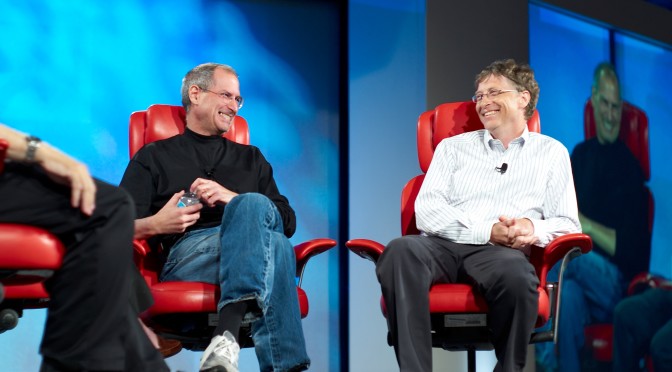I recently watched a few videos featuring Steve Jobs, the first one was his launch of the iPhone (1.0) (https://www.youtube.com/watch?v=9hUIxyE2Ns8) which is such a classic. In one hundred years it will be on every history curriculum, but today is a must for how to present a product launch. Then I saw a video “Steve Jobs and Bill Gates Together at D5 Conference 2007” (https://www.youtube.com/watch?v=wvhW8cp15tk ) which demonstrated the incredible long term relationship between the two tech entrepreneurs.
They needed each other and understood this from the very beginning. The symbiotic relationship starts with Mircosoft developing a competitor to Lotus Notes on the Mac and supporting Apple with their version of Basic. This allowed Mircosoft to create a well proves et of products which could then be translated to DOS and subsequently Windows. It follows through with Mircosoft providing $150m when Apple needed it the most and Steve Jobs makes the phone call, your dealing with me now.
They worked together throughout their careers and had direct access to each other. As two CEO’s they knew there was only one other person who could stamp on their legacy, so building a supportive relationship was the only way for their legacy to be timeless. You may not like Mircosoft but they moved our technology forward to such an extent, Bill became the rich man on the planet. There is only one technology company which you want to hold their products in your hand, and Steve created this timeless vision. A global army of open source technology geeks have still not stake Bill out of the park. Sony the only real contender hasn’t got close, while Samsung with multiple products is just missing it, the shame is I have tried their products and they work but, … its just not right, to the extent I had to spend £600 and buy a iPhone. In fact a Nokia/Microsoft phone is better.
Our double act understood the power of software. When they started out the world was running on hardware and they changed this to software (more importantly now called apps) running on any hardware. Software was the business model which was much more scaleable than hardware. You can sell someone several operating systems.
They both also understood the power of apps before the rest of the planet know what apps were. Mircosoft Office and Apple iMovie are just apps. You can sell someone several hundred apps which extends the sales cycle and more importantly builds a closer relationship with the customer.
This is a case of when great entrepreneurs understand that being alone in a global competitive field is not the ideal situation for continued market domination.
So what should we entrepreneurs learn from this?
You always need competitors, the stronger the better, local competitors are better that those the other side of the world, competitors whereby the sum our parts is greater that the whole and competitors who you can call by the first name and know if the credit hits the fan they will be there to bail you out. After all, we start businesses to work with people and supplying goods to people.
